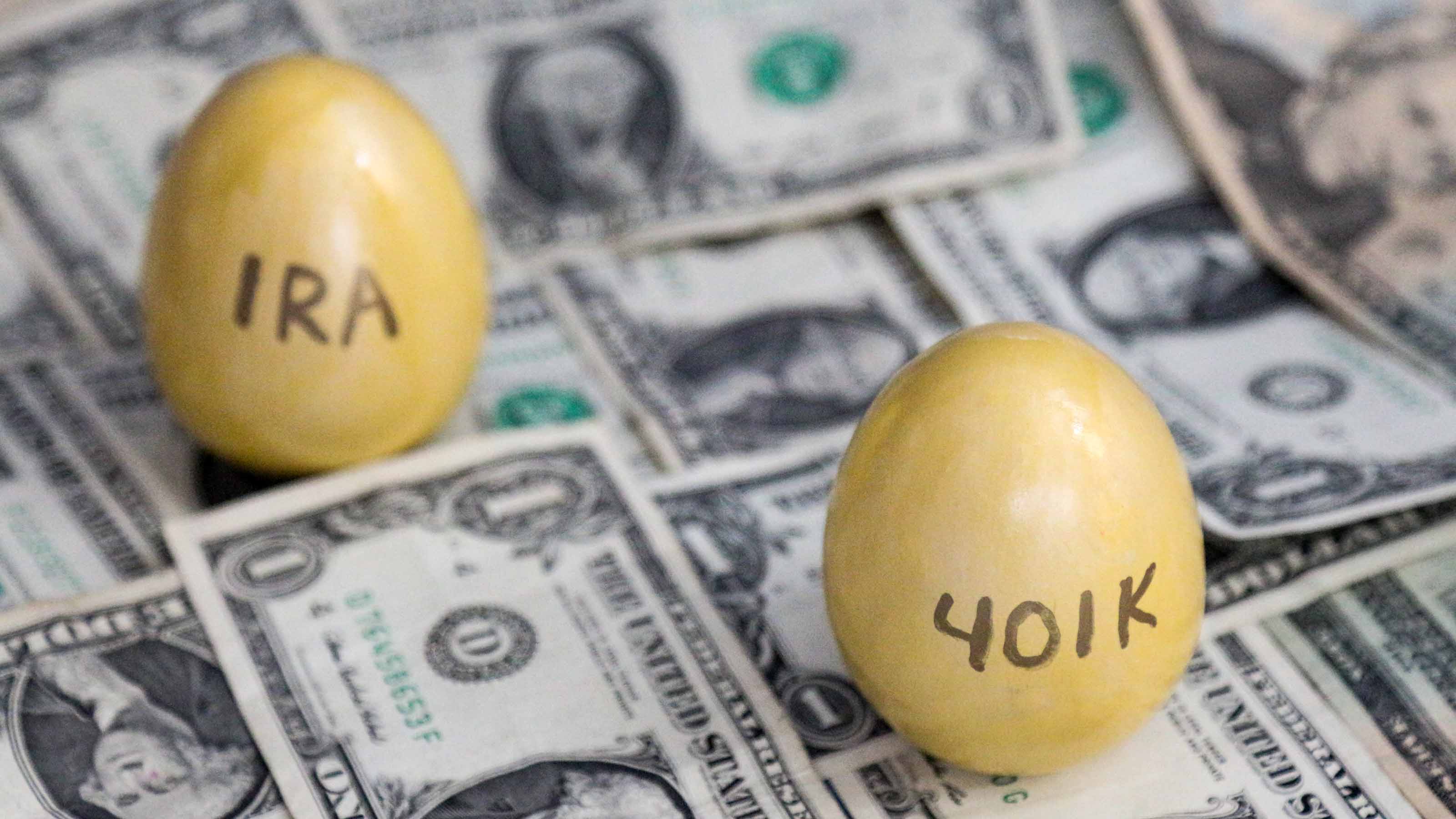Don't Rush to Roll Over a 401(k)
If you're 55 when you leave a job, it might not be a good idea to transfer your retirement account funds to an IRA.

Profit and prosper with the best of Kiplinger's advice on investing, taxes, retirement, personal finance and much more. Delivered daily. Enter your email in the box and click Sign Me Up.
You are now subscribed
Your newsletter sign-up was successful
Want to add more newsletters?

Delivered daily
Kiplinger Today
Profit and prosper with the best of Kiplinger's advice on investing, taxes, retirement, personal finance and much more delivered daily. Smart money moves start here.

Sent five days a week
Kiplinger A Step Ahead
Get practical help to make better financial decisions in your everyday life, from spending to savings on top deals.

Delivered daily
Kiplinger Closing Bell
Get today's biggest financial and investing headlines delivered to your inbox every day the U.S. stock market is open.

Sent twice a week
Kiplinger Adviser Intel
Financial pros across the country share best practices and fresh tactics to preserve and grow your wealth.

Delivered weekly
Kiplinger Tax Tips
Trim your federal and state tax bills with practical tax-planning and tax-cutting strategies.

Sent twice a week
Kiplinger Retirement Tips
Your twice-a-week guide to planning and enjoying a financially secure and richly rewarding retirement

Sent bimonthly.
Kiplinger Adviser Angle
Insights for advisers, wealth managers and other financial professionals.

Sent twice a week
Kiplinger Investing Weekly
Your twice-a-week roundup of promising stocks, funds, companies and industries you should consider, ones you should avoid, and why.

Sent weekly for six weeks
Kiplinger Invest for Retirement
Your step-by-step six-part series on how to invest for retirement, from devising a successful strategy to exactly which investments to choose.
I will be 58 in a few weeks, and I am thinking of retiring. My broker wants me to do a rollover IRA, but then I won't be able to withdraw any amount until I am 59½. What are my options? Thanks for your help.
This is one situation where it could be a bad idea to roll over the 401(k) into an IRA. If you are at least 55 in the year you leave your job, you may be able to withdraw money from your 401(k) at any time without penalty. But if you roll the money over into an IRA, you're generally hit with a 10% early withdrawal penalty if you touch the cash before age 59½.
Public employees can make a similar mistake: If you have a 457 plan, you can withdraw the money without penalty after you leave your job -- no matter how old you are. But if you roll it over into an IRA, you'll generally have a 10% penalty for withdrawals before age 59½, too.
From just $107.88 $24.99 for Kiplinger Personal Finance
Become a smarter, better informed investor. Subscribe from just $107.88 $24.99, plus get up to 4 Special Issues

Sign up for Kiplinger’s Free Newsletters
Profit and prosper with the best of expert advice on investing, taxes, retirement, personal finance and more - straight to your e-mail.
Profit and prosper with the best of expert advice - straight to your e-mail.
There are a few ways to access the IRA money before that age -- if, for example, you withdraw substantially equal amounts each year based on your life expectancy (called the 72(t) rule). To avoid the penalty, you must make these withdrawals for at least five years or until age 59½, whichever is longer.
But it would be a lot easier just to leave your money in the employer's plan for the moment, so you can withdraw it without penalty if you need it before age 59½. Or if your plan allows partial rollovers, you can shift some of the money into an IRA and leave some of it available in the 401(k). Ask your 401(k) administrator about the plan's rules.
Regardless of whether you make the rollover, you still will owe income taxes when you withdraw the money from a 401(k), 457 or traditional IRA.
For more information about retirement withdrawals, see 5 Mistakes You Can't Afford to Make.
Profit and prosper with the best of Kiplinger's advice on investing, taxes, retirement, personal finance and much more. Delivered daily. Enter your email in the box and click Sign Me Up.

As the "Ask Kim" columnist for Kiplinger's Personal Finance, Lankford receives hundreds of personal finance questions from readers every month. She is the author of Rescue Your Financial Life (McGraw-Hill, 2003), The Insurance Maze: How You Can Save Money on Insurance -- and Still Get the Coverage You Need (Kaplan, 2006), Kiplinger's Ask Kim for Money Smart Solutions (Kaplan, 2007) and The Kiplinger/BBB Personal Finance Guide for Military Families. She is frequently featured as a financial expert on television and radio, including NBC's Today Show, CNN, CNBC and National Public Radio.
-
 Over 65? Here's What the New $6K 'Senior Deduction' Means for Medicare IRMAA Costs
Over 65? Here's What the New $6K 'Senior Deduction' Means for Medicare IRMAA CostsTax Breaks A new deduction for people over age 65 has some thinking about Medicare premiums and MAGI strategy.
-
 U.S. Congress to End Emergency Tax Bill Over $6,000 Senior Deduction and Tip, Overtime Tax Breaks in D.C.
U.S. Congress to End Emergency Tax Bill Over $6,000 Senior Deduction and Tip, Overtime Tax Breaks in D.C.Tax Law Here's how taxpayers can amend their already-filed income tax returns amid a potentially looming legal battle on Capitol Hill.
-
 5 Investing Rules You Can Steal From Millennials
5 Investing Rules You Can Steal From MillennialsMillennials are reshaping the investing landscape. See how the tech-savvy generation is approaching capital markets – and the strategies you can take from them.
-
 457 Plan Contribution Limits for 2026
457 Plan Contribution Limits for 2026Retirement plans There are higher 457 plan contribution limits in 2026. That's good news for state and local government employees.
-
 457 Contribution Limits for 2024
457 Contribution Limits for 2024retirement plans State and local government workers can contribute more to their 457 plans in 2024 than in 2023.
-
 Catch-Up Contributions to Retirement Accounts Boosted By SECURE Act 2.0
Catch-Up Contributions to Retirement Accounts Boosted By SECURE Act 2.0Americans approaching retirement age can now squirrel away more money in IRAs, 401(k)s, and other retirement accounts.
-
 Getting Ready for Retirement? We Explain Key Elements and Options
Getting Ready for Retirement? We Explain Key Elements and OptionsRetirement savings are just one component of your financial profile once you hit your golden years.
-
 Save More for Retirement in 2023 Thanks to Higher IRA and 401(k) Contribution Limits
Save More for Retirement in 2023 Thanks to Higher IRA and 401(k) Contribution LimitsIf you're saving for retirement, you can contribute a lot more to an IRA, 401(k), or other retirement account in 2023.
-
 401(k) Contribution Deadline Coming Soon
401(k) Contribution Deadline Coming SoonYear-end is the common deadline for making max 401(k) contributions that can increase your savings for retirement and help lower your tax bill.
-
 IRAs vs. 401(k)s: Exceptions to 10% Penalty for Withdrawals Under Age 59½ Differ
IRAs vs. 401(k)s: Exceptions to 10% Penalty for Withdrawals Under Age 59½ DifferIRAs Before pulling money out of retirement accounts early, check the rules. The exceptions to penalties can differ depending on which type of account you’ve got.
-
 IRAs and 401(k)s Are Nice Now, But Will RMDs Hamper Your Retirement?
IRAs and 401(k)s Are Nice Now, But Will RMDs Hamper Your Retirement?Roth IRAs We’ve got four years left until tax rates are set to revert to higher levels, so workers may want to shift their thinking away from 401(k)s and traditional IRAs in favor of Roth accounts.